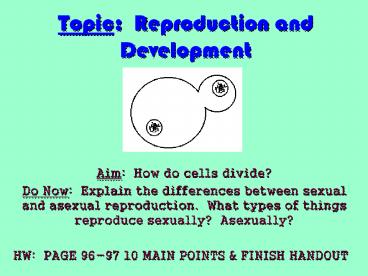Topic: Reproduction and Development - PowerPoint PPT Presentation
1 / 28
Title:
Topic: Reproduction and Development
Description:
Topic: Reproduction and Development Aim: How do cells divide? Do Now: Explain the differences between sexual and asexual reproduction. What types of things reproduce ... – PowerPoint PPT presentation
Number of Views:298
Avg rating:3.0/5.0
Title: Topic: Reproduction and Development
1
Topic Reproduction and Development
- Aim How do cells divide?
- Do Now Explain the differences between sexual
and asexual reproduction. What types of things
reproduce sexually? Asexually? - HW PAGE 96-97 10 MAIN POINTS FINISH HANDOUT
2
What are the two types of reproduction?
- Asexual reproduction
- Sexual reproduction
MEIOSIS
MITOSIS
3
What is ASEXUAL Reproduction?
- Requires one parent that divides
- Asexual Aparent
- Offspring are identical to parents
- Same of chromosomes
4
How does ASEXUAL reproduction occur?
- MITOSIS cell division
- One cell divides into two identical daughter
cells (same of chromosomes as parent) - Occurs in all body cells EXCEPT sex cells
5
What are the steps of Mitosis?
- Interphase
- Prophase
- Metaphase
- Anaphase
- Telophase
- Cytokinesis
IPMAT
6
Interphase
CHROMATIN
The mass of DNA inside the nucleus during
interphase is known as CHROMATIN.
7
Prophase
8
Metaphase
9
Anaphase
10
Telophase
11
What are the steps of Mitosis?
- INTERPHASE cell grows to mature size and
chromatin replicate (makes copy of DNA) - PROPHASE chromatin forms chromosomes, nuclear
membrane disappears and spindle fibers form - METAPHASE chromosomes line up in the Middle of
the cell - ANAPHASE chromosomes separate and move Away
from each other - TELOPHASE nuclear membrane starts to form
12
What is Cytokinesis?
- Part of telophase
- Cell membrane pinches in (cytoplasm separates)
resulting in 2 new cells
CYTOKINESIS
13
How is mitosis different in plant cells?
- Cell membrane DOES NOT pinch in
- Instead a CELL PLATE forms between 2 new cells
- Plant cells do not have centrioles (animal cells
do)
CELL PLATE
14
Cytokinesis Animal and Plant
15
What is Cancer?
- Abnormal and uncontrolled cell division
16
What are the different types of ASEXUAL
Reproduction?
- Binary Fission one celled organism divides into
two identical cells (mitosis) - Binary Fission means equal division
- Examples ameba and paramecia
- Budding unequal division of organisms
- Examples hydra, yeast
- Sporulation spores (specialized cells) develop
into new organisms (mitosis) - Examples mold, mushrooms
17
What are the different types of ASEXUAL
Reproduction?
- Vegetative Propagation Asexual reproduction
used by plants - Runners (strawberries)
- Buds (potatoes)
- Grafting (roses)
- Bulbs (onions)
18
Binary Fission Budding
BINARY FISSION
BUDDING
19
Sporulation
20
Vegetative Propagation
RUNNERS
GRAFTING
BULBS
BUDS
21
Topic Reproduction and Development
- Aim What is sexual reproduction?
- Do Now Why does sexual reproduction require two
parents?
22
What is sexual reproduction?
- Requires 2 parent cells, each with half the
normal number of chromosomes - Involves sex cells
- Human sperm egg ? zygote
- 23 23 ? 46
23
What is meiosis?
- Cell division occurs only in sex organs to
produce sex cells (sperm and egg) - Produces 4 daughter cells with half the number of
chromosomes as parent cell (23 in humans) - 2 divisions (1 ? 2 ? 4)
24
Meiosis
25
How does meiosis occur in males?
- Occurs in testes to produce sperm
- Produces 4 new sperm cells
26
How does meiosis occur in females?
- Occurs in ovaries
- Produces 1 egg cell and 3 polar bodies
27
What is fertilization?
- Union of egg and sperm to form a zygote
- Two types
- Internal fertilization occurs inside the female
(humans) - External fertilization occurs outside the
female (frogs) can occur on land or in water
28
What happens to the zygote after fertilization?
- Zygote divides by MITOSIS to form 3 layers that
will develop into different parts of the embryo - Outer layer forms the skin and nerves
- Middle layer forms muscles
- Inner layer forms heart and stomach































